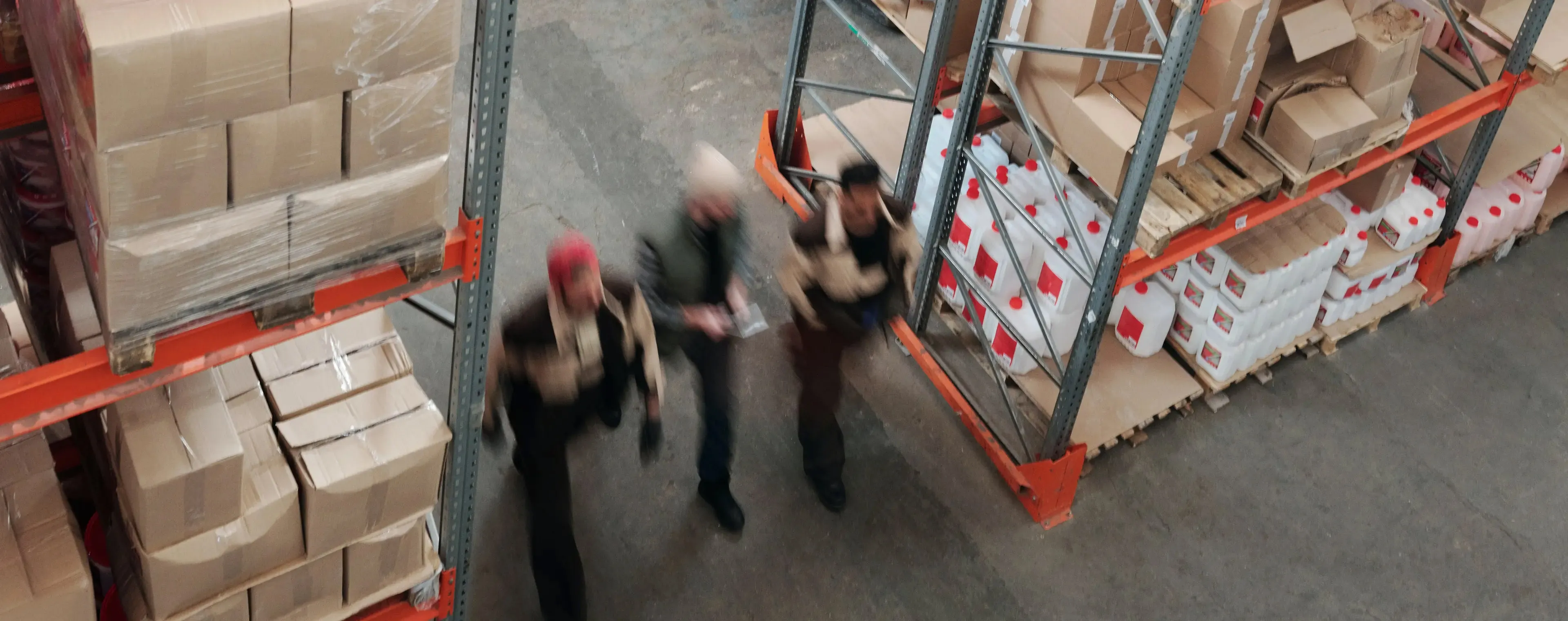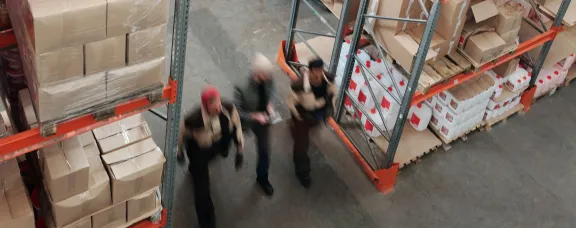Factories and warehouses can be dangerous places to work, with heavy loads, possibly hazardous products and industrial machinery. Examples of factory or warehouse workplace injuries include those caused by operating machinery that was not properly maintained or without proper training, manual handling injuries, chemical burns and injuries caused by falling from heights. Find out more on the common causes of warehouse or factory accidents below.
Responsible employers in Scotland should have in place systems to prevent injuries and to reduce the risk of contacting COVID. If you are injured at your factory or warehouse workplace, you can claim compensation if adequate precautions were not taken, and our specialist Personal Injury team can help you with all aspects of your workplace injury claim.
Accident causes in warehouses or factories
Each factory and warehouse has its own potential accident risks, but there are some common causes of injuries.
Unsafe systems
It is important in any factory or warehouse that has machinery and processes to manufacture or store goods that there is a system in place to ensure employees are kept safe. Your employer has a duty to assess the risks of any task they want you to do and devise and implement a safe method for you to carry out that task. If this is not done and the system is unsafe, there is a danger that you may suffer an injury. In such a situation, you could be entitled to claim compensation for your work place injury.
Faulty work equipment
Work equipment covers a range of objects used in the course of your employment. This can include static machinery but also other items such as a trolley, power tools, a ladder or a bucket used for cleaning. The equipment is ‘used’ if the activity involves starting, stopping, programming, setting, transporting, repairing, modifying, maintaining, servicing or cleaning.
Your employer has a duty to provide you with safe work equipment. They must inspect and maintain the work equipment and ensure you are trained to use it. Specific dangers and risks when using the equipment should be pointed out to you during your training and your employer must provide you with suitable protective equipment such as goggles and gloves. They must also remove faulty equipment immediately for repair.
If you are injured by faulty work equipment then you may be entitled to claim compensation for your injury.
Lack of training on industrial equipment
Working with industrial equipment can be dangerous. Serious injuries can occur if you are struck by a moving part of the machine, caught or crushed by the machine. There is also the danger of burns from very hot or cold equipment.
Your employer has a duty to ensure not only that their industrial equipment is in good working order but also that the operator has received sufficient training. That can mean that even if you sustain an injury in a factory or warehouse while operating a machine you can still claim compensation if the accident could have been avoided had better training been provided.
Workplace falls
Your employer should provide a safe working environment for you, including preventing the risk of slips and trips at their warehouse or factory. They also have a responsibility to ensure that every floor and traffic route in your workplace is suitably constructed and free from obstructions and substances that may cause you to slip, trip or fall. So the flooring should not be uneven or slippery. In a factory or warehouse, an employer’s obligations can include, for example, ensuring that there is a system in place to clean the floors regularly, or having separate clear traffic routes for pedestrians.
Your employer is also responsible for the acts and/or failures of their employees. So, for instance, if your colleague left an object on the floor and you tripped over it injuring yourself, you may be eligible to make a personal injury compensation claim against your employer.
Poor condition of workplace
Factories and warehouses have their own challenges regarding the working environment. There are regulations in place to ensure that there is suitable and sufficient lighting and that the workplace is well ventilated with a sufficient quantity of fresh air. If you suffer an injury at work due to the poor condition of your working environment, your employer could be liable to pay you compensation.
Manual handling
Manual handling is any task that involves moving a load by carrying, pushing, pulling or lifting, and such tasks are commonplace in factories and warehouses. You might find that this is part of your daily tasks at work or something you may do less frequently.
Manual handling tasks if done incorrectly, with the wrong equipment or with too heavy a load, can cause injury. They may also worsen existing medical conditions.
Your employer has a duty to review their working practices and, where reasonably practicable, avoid any manual handling task. If there has to be a manual handling task, it should be risk assessed. The risk assessment should take into account your particular abilities, including any existing or previous injuries or if you are pregnant.
Your employer should take reasonable steps to reduce the risk of injury to you while carrying out such tasks, for example ensuring there is adequate manpower, and by providing proper training and equipment.
Hurt by falling objects
In warehouses in particular, there are often goods stacked at height. Being hit by falling objects at work can be the cause of serious injury and potentially death.
Your employer has a duty to reduce the risk of injury to you. If you are injured at work due to falling objects you may be eligible to make an injury at work compensation claim.
Examples of warehouse injury cases which may have grounds for claims include when:
- Items are not stacked correctly
- There is defective equipment which has not been inspected or maintained resulting in parts breaking free
- Other employees drop objects while working at height
Lack of protective personal equipment
In a factory setting, it is fairly common for employees to require protective personal equipment (PPE). Your employer has a duty to provide you with PPE, such as goggles, gloves and helmets. The PPE supplied must be fit for purpose, properly stored and maintained, you must be trained in its use and you must use it properly. Your employer has to enforce the correct use of the PPE.
If you have been injured in a factory accident as a result of defective PPE or lack of PPE then you may be entitled to claim compensation for your injury.
How can Thorntons help?
At Thorntons, our expert claims team, including Accredited Specialists in Personal Injury Law and Solicitor Advocates, are here to help you throughout your factory or warehouse accident claims process. With our experience and friendly approach, you can trust us to help you get the compensation you deserve following your accident and support you at what can be a worrying time. We work on a no win, no fee basis so you can pursue you claim with no financial risk.
You can start your workplace injury claim today by calling us free on 0800 731 8434 or complete our enquiry form. We will talk through your situation, the circumstances surrounding your factory or warehouse injury, answer any questions you may have and advise you if you can make a personal injury compensation claim for your warehouse or factory injury. Our discussion will be confidential and you are under no obligation to make a claim. You can also take a look at our Claims Calculator to find out how much compensation you may be entitled to after a workplace injury.
Our Services
We advise clients who have suffered injuries through many different circumstances, backed by our team of expert Solicitors.
























